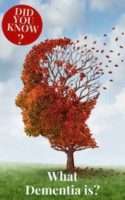Imagine forgetting your mom, dad, siblings or even kids. Imagine not knowing where you live despite going home every day for your entire life. Sounds scary right? For some older people, this is their reality; they don’t know it because they can’t remember, but they have forgotten almost all aspects of their life. The culprit of their memory loss, amongst other symptoms, is called Dementia.
But dementia isn’t just plain old, “I forgot to buy shampoo” or “How could I forget to call Lauren for her birthday”. According to a medical review by Brunilda Nazario, “Dementia is a broad term that describes a loss of thinking ability, memory, attention, logical reasoning, and other mental abilities.”
For those of you who think that Alzheimer’s and dementia are the same thing, then don’t be fooled. Alzheimer’s disease is caused by dementia, and about 60%-80% of people with dementia has Alzheimer’s. There are a wide range of causes for dementia, up to 50 causes.
Brunilda Nazario explains, “About 5%-8% of adults over age 65 have some form of dementia. This percentage doubles every 5 years after 65. As many as half of people in their 80s have some dementia.”
Causes of dementia
According to a review by Mayo Clinic, “Dementia is caused by damage to or loss of nerve cells and their connections in the brain. Depending on the area of the brain that’s damaged, dementia can affect people differently and cause different symptoms.”
Types of dementia include:
– Alzheimer’s disease
– Vascular dementia
– Dementia from Parkinson’s disease and similar disorders
– Dementia with Lewy bodies
– Frontotemporal dementia (Pick’s disease)
– Creutzfeldt-Jakob disease
Dementia is also called neurocognitive disorder. Remember that dementia isn’t a disease, but more so it’s a group of symptoms caused by other conditions.
Symptoms of dementia
Symptoms of dementia include cognitive changes such as memory loss, difficulty communicating, visual and spatial abilities (like forgetting where your home is), difficultly with planning and difficulty with coordination and motor functions. Psychological symptoms of dementia include personality changes, depression, anxiety, inappropriate behaviour, paranoia and agitation.
Risk factors
Things such as age and family history are things that cannot be changed when dementia is concerned. For instance, if your family has a history of dementia then you have a high risk of getting it too.
Diet, exercise, excessive alcohol use, depression, diabetes and head trauma, amongst others, can all lead to dementia, however, these are risk factors that are somewhat in your control.
Prevention
There is no cure for dementia nor is there a set way to prevent it. Just like many other disorders and illnesses the best way to try and prevent is by living a healthy lifestyle. Exercise regularly, eat healthily, treat underlying conditions, sleep well and the list goes on.
Childhood Dementia
Not to frighten you in anyway, but there are very rare cases where kids, even when they are born, have dementia.
According to Dr Sanchari Sinha Dutta, “Childhood dementia is a neurological disorder that affects brain metabolism. Typical symptoms include retinal degeneration, epileptic seizures, visual loss, deafness, cognitive deterioration, and impaired motor functions, with a high probability of early death.”
Remember the person inside
Dementia is a terrible disorder for either party, both the individual diagnosed and the family concerned. You see your loved one slowly slip away from you and there’s simply nothing anyone can do.
Life is short. Spend time with those closest to you and always show that you care. If you know of anyone with dementia remember, “The disease might hide the person underneath, but there’s still a person in there who needs your love and attention” – Jamie Calandriello
***
Read more here on the five stage of grief.
Tell us: Do you know of anyone who suffers from dementia? Share your experience with us.

